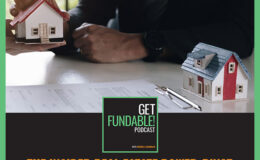
Don’t miss out on the opportunity to build wealth through real estate in 2024. Instead of being uncertain like others, adopt a multidimensional strategy that transforms current investments into future successes. In this episode, Jason Hartman reveals a top-down real estate investing forecast for the year 2024. Discover how the global mindset and the ambition of 8 billion people contribute to keeping the economy thriving and innovative. Jason discusses the real estate market dynamics and why the common predictions of a crash might be missing the mark. He breaks down the power of mortgage rates, the lock-in effect, and the surprising stability in the current market. Jason introduces the concept of inflation-induced debt destruction, a strategy that uses today’s money to reduce future debts. Tune in now and get ready for a long year ahead.
—
Watch the episode here
Listen to the podcast here
A Top-Down Real Estate Investing Forecast For 2024
I’ve got an amazing opportunity in our guest, Jason Hartman. I heard him in a presentation, and he blew me away with not only his acuity in the real estate investing marketplace but also his amazing grasp of what has happened, what is happening, and what is likely to happen in the future. He’s here to tell you that for himself. You could be as blown away as I was. Jason Hartman, welcome to the show.
Merrill, thanks so much for having me. I hope I can share some great insights for your audience on peeling back the different layers of the onion when it comes to analyzing the real estate market and the macroeconomy in general. There’s so much misinformation out there nowadays. I am shocked at how few experts understand the dynamics of the market. They’ve virtually all been wrong.
I have shared a lot on my podcast and my YouTube channel. That is a whole list of all these predictions by all of these different organizations, whether Zillow, Redfin, Fannie Mae, Freddie Mac, or Goldman Sachs. They were all wrong. Every single one of them was wrong about how 2023 would turn out. They’re all starting to make predictions for 2024. I stick to some simple market dynamics. I’ll share those with you.
Before we dive into that, I’ll tell your audience about myself in case you’re familiar with my work. I’ve been teaching people about long-term buy-and-hold real estate investing for several years. Before that, I was in the traditional real estate business. I owned a traditional real estate company in Southern California. Coldwell Banker purchased it from me in 2005.
At that point in my life, I could have easily retired, but I’m not interested in retirement. It’s not about money. It’s about a mission that I became financially free a long time ago. I like teaching and sharing what I learned from all of the interviews. I’ve done over 2,000 interviews on my main podcast alone. I’m talking with experts and economists all day long about real estate, techniques, strategies, markets, and the economy. I hope to answer the question, what should I do next? How should I react to all these fundamental things that are happening in the marketplace so that I can not only protect my wealth but also grow it? When I say I, I am speaking to the readers. Hopefully, I’ll share some of that with everybody.
This audience is no stranger to peeling back the curtain and looking at the machine. That’s what fundability is. We help people look at what banks are evaluating rather than this credit score or mystery three-digit number that people have been trained in. We have an entire course called Credit Myths Exposed like you’re exposing myths and misrepresentation. My audience is highly tuned to read what you say about pulling back the curtain and seeing what’s happening out there.
That's what fundability is. We help people look at what banks are actually evaluating rather than this credit score. Share on XIt sounds like you got some myth-busters in the audience.
Our entire business metaphor is the financial matrix. How do we wake up, see the truth, and leverage opportunities since we know the truth?
There are a lot of powerful people and institutions conspiring against people financially. I always say that the core mission of Wall Street is to separate the middle class from their money. They do a great job of it. Hopefully, we’ll help people gain more control. Before we get into the market, I wanted to talk about this landmark case. It was decided. I’d be remiss because I got the alert on this before this show.
Some people may not know this, but there has been this giant lawsuit that’s been going on by various people accusing the National Association of Realtors, which is the largest trade lobbying organization on planet Earth. It’s about 1.5 million people to a huge organization. I used to be a member of it years ago when I was in the traditional real estate business. I’m not in that business now. I’m not affected by this, but it is interesting.
It’s against NAR and a bunch of different big-name brokerages, home services, and Keller Williams. The accusation was that these groups were colluding to increase commissions and violating antitrust laws. I’m not a lawyer. I don’t know the details about this case. I haven’t been following it a whole bunch. I’ve been keeping tabs. There is a verdict. They found that these groups were guilty of this. The defendants have been ordered to pay damages of $1.78 billion. This is a landmark case that will change the real estate industry forever. This is a big deal.
What are the big dominoes that are coming as a result? They’re going to appeal, but let’s say they uphold. Is this a price reduction in that 6% on each side of the buyer and the seller is no longer the status quo? What do you see?
Commissions are not fixed by law. That’s the whole point. They’re negotiable between buyers, sellers, agents and brokerages on each deal, which is individual. For many years, realtors have tried to set this standard of 6%. These prices have inflated. It became 5%. That was more common, but it’s not set by law. It’s not fixed. Everybody can negotiate their own deal.
Everybody can negotiate their own deal. Share on XBy the dynamics and the nature of the way the multiple listing service works, there is a case to be made that you can’t negotiate that much. What the plaintiff did was make that case, and they won. It’s quite interesting. I don’t know what the effects will be yet. I honestly haven’t thought that much about it, but I can tell you this is a big deal, and it will shape the industry.
Let me make a statement. Considering that I’ve had a real estate license since I was 19 years old, I got my real estate license in my first year of college. A lot of people might think I’m a trader by what I’m about to say. For many years, even when I was in the traditional real estate business, I have been outspoken, saying, “Commissions are high.”
There’s more. I’m not a trader in my industry. Here’s what I think about that. When you dissect this and understand it, when realtors charge 6% back in 1900 or 1903, houses cost $1,000. The price of real estate has traditionally risen faster than the rate of inflation. Those commissions are paid on the debt and the equity. Real estate is a leveraged asset class.
The fact that real estate is typically a leveraged asset class means people get a mortgage when they buy a home. The amount of commission versus the amount someone would pay for the house has been leveraged. It’s grown much faster than the rate of inflation. What this has done is, because there’s virtually almost no barrier to entry to getting into the real estate business, everybody and their brother has a real estate license.
There’s a joke about where I’m from and where I spent most of my career. It’s in the Socialist Republic of California. I now live in the free state of Florida. There’s a joke in California that when you get pulled over for a traffic ticket, the police officer will say, “May I see your license?” You say, “Which one, my real estate license or my driver’s license?” Everybody’s got a real estate license.
The problem is I think commissions are high, but at the same time, the real estate people have to charge those high commissions. They have to spend such a ridiculous amount of money on marketing to attract customers because the field is crowded. That is a dysfunctional business. If fewer people were in the real estate business because it wasn’t lucrative, the practitioners in that industry wouldn’t have to spend so much time and money on marketing, and they could spend more time doing their trade and practice. Commissions would go down, and realtors would have a higher volume of business they wouldn’t have to fight for in the market. That would be a more functional market, but it’s dysfunctional.

Real Estate Crash: If fewer people are in the red ocean real estate business because maybe it wasn’t so mega lucrative, then the practitioners in that industry wouldn’t have to spend so much time and money on marketing.
We have a true red ocean, where everybody is fighting for the same few buyers. Thank you for that. You read it here first. It’s a landmark case in real estate, commissions, and damages for colluding all the parties involved in trying to keep these rates artificially high. There’s a group here at a FinTech, but they’re a real estate FinTech called Homey. Their whole thing is it’s 1%. They get all these services. There’s room for people to optimize the real estate buying and selling process. People are doing it all the time.
It’s not a law, but it’s similar in credit. You believe something is true because it’s been done for many years. Everybody believes that 6% is justifiable. Thank you for that. The original point of why I invited you to speak to my crew is that let’s touch on what’s happening in the market over the last couple of years and what we see likely for the future because the deck you’re about to share with us is the one I saw you guys, and it blew my mind. I ran up to the stage after he finished his presentation and said, “I want you to talk to my community.”
Merrill, this isn’t the exact slide deck you saw. For the record, it’s different, but a lot of the same points here. What we’ve got is we’ve got a lot of doomerism and fear porn. A lot of people are spreading bad news. For most of our history as people on this Earth, our minds were trained to look at the negative because that helped us survive. Only since the Industrial Revolution have we lived in this world of amazing abundance, but still, our old brain looks for negativity and hones in on it.
We need to train ourselves away from that because the world is a much more abundant place than it’s ever been in history. You got to zoom out and look back at the bigger space of time. Don’t look at the last year. The interest rates are through the roof. I get it. Back up and look at the big picture. This is equivalent to people playing on primitive emotions.
The world is a much more abundant place than it's ever been in history. Share on XLizard’s brain is affected by the fatal nature of what’s happening to us.
They’re out there with these clickbait titles. You surf around the internet and YouTube. You’re like, “The world is coming to an end.” Ever since Malthus got the name Malthusian Economics, which was this whole idea that the world would run out of food due to overpopulation and we’d all perish, the complete opposite happened. Everybody is fat for needing too much food. All of these doomers have always been wrong, and we need to realize that.
I’ve had Peter Schiff on my show, Howard Ruff, and a bunch of doomers over the years. If you look at the history of Howard Ruff, he is this gold-bug Mormon guy. Back in the ‘70s, he was writing about how the world was going to end. You better stock up on food. The complete opposite happened. All these people have always been wrong. Peter Schiff has been wrong.
A broken clock is right twice a day. The same goes with Peter Schiff. He has published some videos saying he was right about the Great Recession. He’s been predicting doom and gloom for several plus years since I’ve been following him. Eventually, you’re going to be right. That’s not a legitimate track record.
I do have to insert there before we leave Howard Ruff. He lived in Modesto, California, which is where I grew up. He moved back to Utah, and I dated his daughter, Pamela. I was in the middle of the gold boom. Buy gold. The world is ending. I was intoxicated because I was part of the family. It was fascinating to be there live in ’78 and ‘79 when we had post-oil embargoes. That was all proof in the pudding. Schiff is part and parcel of two Ps in the same pod.
The thing people underestimate is that virtually every human on Earth gets up every day. Their whole day is about how I am going to improve my life and improve my situation. Can you imagine the power of 8 billion people doing that? That’s what keeps the economy going. That’s what creates innovation. Everybody is always thinking about, “How am I going to better my situation? How am I going to improve my life? How am I going to gain more abundance?” That’s what we do as humans. We have constructive discontent. We have egos, and those egos drive us to achieve things. The ego is not all bad.
That's what we do as humans. We have constructive discontent. We have egos and those egos drive us to achieve things. Share on XWe wouldn’t be anywhere without it.
You wouldn’t have progressed if it wasn’t for ego. Here’s what happened. As all the people were predicting the real estate crash, look at what happened. We saw the cyclical markets on the West Coast get a hit, a tiny amount where they dropped over 2%. That’s hardly a crash. Some of the other markets next to them, Arizona and Nevada, dropped 2.06% collectively. The rest of the country has seen massive appreciation. When everybody has been predicting we’re going to go into a recession, we saw the GDP grow amazingly in the last quarter, 4.9%. It’s the engine of innovation and technology. People’s ambition keeps pushing this thing forward. It’s a powerful thing.
If you look at homeowners, they don’t want to sell their homes. They have these incredibly cheap mortgages. I predicted this after COVID started. I knew that the Fed was going to ease to avoid a problem with the economy. As unemployment was projected to approach 40% something, it was devastation. The centrally planned economy in which we live and all these central banks around the world were saying, “We have to flood the world with money and currency now to keep things going.” They did do that, and we saw the largest expansion of the money supply in any of our lifetimes. We saw these ultra-cheap mortgages.
The Federal Reserve put a poison pill into the housing market. I say poison pill like it’s a bad thing, but it could be a good thing depending on what side you’re on here. The poison pill is these low-rate mortgages last for a few decades. They are going to cause a lock-in effect and golden handcuffs effect on the marketplace, where people will not want to give up their mortgage assets. Most people think, “The house is the asset. The mortgage is the liability.” That’s wrong. The mortgage is an asset, especially when a couple of things happen.
Number one, the mortgage is below current market rates, which way below, and the mortgage is below the rate of inflation, nominal or real inflation, or you get to pay the mortgage back in cheaper dollars through inflation. This is a strategy I created several years ago. I trademarked this strategy. I become famous for it. It’s called inflation-induced debt destruction. What it means is that you borrow money at this time dollars, and you pay the money back at tomorrow’s cheaper dollars that have been debased by inflation. It’s an amazing hidden wealth creator, Merrill.
We have this lock-in effect, and people don’t want to sell their mortgages. Let’s look at some of the stats on that. Forty-five percent of the existing mortgage market has a mortgage at or below 4%. A smaller percentage of the market, which is 26%, has a mortgage below 3%. The size of this market is over 65%. That is shocking. These people are comfortable.
Here’s one of the giant mistakes all the predictors of doom have made. They have screwed up because their myopic view of the situation is this, “Mortgage rates and housing prices are high. Housing affordability is the lowest it’s been in 40 years. This is going to cause a real estate crash.” That’s wrong. Why is that? The simple, most basic law of economics is supply and demand. There is one ingredient that you must have if you want to have a housing crash. That is, millions of distressed homeowners must sell their homes quickly. We have the complete opposite of that.

Real Estate Crash: There is one ingredient that you absolutely must have if you want to have a housing crash. And that is millions and millions of distressed homeowners that must sell their home quickly.
The myopic people look at what’s going on now and over the past year, which only affects about 4 million homes. What they don’t look at is the important part, which is what happened a couple of years before that, which affects about 136 million homes. That’s the market. Looking now is not what’s important. What’s important is what happened during the COVID era when virtually the entire country either purchased a new home or refinanced their existing mortgage and locked in these low rates. Those people are the people we need to be considering.
Sixty-five percent of the country has a mortgage at or below 4%. It’s a comfortable mortgage payment. If they sold their house or got foreclosed on, it would be more expensive for them to rent than it is to stay where they are and own that house. The poison pill that the Fed put into the market has several years left on it.
That’s a lifetime for a productive employee.
It’s a generation. These people are not going to be in a position of hardship. It’s very unlikely. You’re always going to have some hardship in any market. The foreclosure rate now is non-existent. There’s hardly any foreclosure. There’s a whole segment of the real estate industry that is in the foreclosure business. Title companies and real estate brokers specializing in foreclosures and contractors doing rehab and remodels for foreclosures are starving. There’s nothing for them to do. There’s no foreclosure market at all to speak of. We have one of the lowest foreclosure rates in history. Anybody is in default. Why would they be? They’ve got these incredibly cheap mortgages.
This is the important thing. Here’s what I didn’t tell you. One of the things I always talk about on my podcast and my YouTube channel is this great saying, philosophy, or mental model and that is, “You can’t hear the dogs that don’t bark.” This came from a Sherlock Holmes episode. Sherlock Holmes, the great detective, found out who murdered someone because the dog didn’t bark. He knew that the dog must have known the killer. That’s how he found the killer because the dog didn’t bark.
What I am not telling you is when I say that 25% of the country has a mortgage add or below 3%, and 65% of the country has a mortgage add or below 4%. It’s comfortable. People who aren’t experiencing any hardship here’s what I didn’t tell you, which is even more amazing. Forty-two percent of all the homes in America have no mortgage at all.
We’re still talking that this 65% is above and beyond the no mortgage crew.
The 65% below 4% is of the people who have mortgages.
It’s not the 25% who don’t.
There are 42% of the country that has no mortgage at all. Almost half of the homes in the country are free and clear. It’s hard to go into foreclosure if you own your house free and clear. That’s where we are. The important part is who has the existing mortgages. That’s the thing. There are three types of markets in the country. Linear markets, cyclical markets, and hybrid markets. These act differently.

Real Estate Crash: Newsflash, people. It’s very hard to go into foreclosure if you own your house free and clear.
A linear market is the market we recommend that people invest in. We’ve done tons of business in Memphis, Tennessee, over the years. The linear market is boring. It chugs along. It has ups and downs. It’s not pronounced and not a big deal. It’s the same with Indianapolis, another one of our markets. Take where I grew up, for example, which is a cyclical market in Los Angeles, California.
Look at this. It has ups and downs, glorious highs, and ugly lows. This is a market that has huge gyrations and never has good cashflow. It’s landlord unfriendly. It’s not a market you would want to invest in. It’s hard to predict the swings in prices. The cashflow will be terrible in markets like this. We stick with these good, solid linear markets that are the conservative markets.
Another interesting thing when I talk about the existing homeowners and their position is how they feel now. Are they struggling? This chart is from the Federal Reserve website. It shows the mortgage debt service payments as a percentage of disposable personal income. That’s what this chart is. You see, during the COVID era, this is small. During the COVID era, the percentage of mortgage debt in comparison to disposable personal income was the best it’s been since 1980. Houses were affordable.
Why is that? Mortgage rates and house prices were incredibly low. The prices hadn’t gone up yet. Right. We have higher mortgage payments for someone who would buy a home now. Housing affordability is low. We also have higher prices. This affordability has gotten worse. If I were to create a title for a YouTube video, I could say, “Housing affordability sinks. People are under much more pressure than they were several years ago.”
That would be true, but it wouldn’t be true enough because the big picture is even now, their mortgage payments are vastly more affordable than they were leading into and during the Great Recession and at any time after that, until the COVID era and all the way decades before that to 1980. People are comfortable in their existing mortgage situation now.
What they’ve done is they’ve gone back in time. They got into a time machine. Anybody who purchased or refinanced during the COVID days got into a time machine. The mortgage payment that they got in 2021 was $1,001. That’s the exact median mortgage payment in the United States in 2021. That was on a $397,000 house median price.
If you go back several years before, the median mortgage payment was $18 higher on a house that was quite a bit cheaper at only $225,000. You have to adjust this mortgage payment and the house price now for inflation. About 27% of inflation has occurred since then. The mortgage payment is the vast majority of the country, and we have about 140 million housing units in the US, and about 136 million of them have a mortgage payment equivalent to over $700 a month in 2011 dollars. They are comfortable. They’re better off than the people in 2011 were by 27%.
It’s $200 less expensive based on relationships.
Here’s the foreclosure activity. REO means real estate owned. This is Fannie Mae’s reported number of REOs, which is non-existent. There’s nothing to do. There’s no foreclosure activity to speak of. Here’s the mortgage delinquency rate and foreclosures by 30 to 60 days delinquent on their mortgage. Are they over 90 days? Are they in the foreclosure process? There’s nothing going on here. This is almost a non-issue. There’s always a little bit of it. It’s hardly anything to speak of. Here’s another single-family serious delinquency rate. This is 90 days plus of facing foreclosure, and nothing is happening here. Existing home sales are way down. A lot of people have confused sales volume with sales prices. Those are different things.
Explain that.
A good way to look at it is if you’re sitting in a chair at home, close your eyes for a minute and visualize your kitchen sink. Mine is stainless steel. It’s got one of those nice faucets on it that you pull out, and it has all these adjustments. It’s got some beautiful white and grey quartz countertops. That’s my kitchen sink. Visualize yours, and let’s look at the real estate market in terms of kitchen sinks.
If we picture the faucet in the new listings coming on the market or the new homes coming up for sale, whether they be new construction or resale properties, the faucet right now is trickling out a little bit of water. Hardly anything is coming onto the market because nobody wants to sell. The faucet is at a trickle. It’s barely on. The basin of the sink represents the existing inventory in the marketplace. Compared to a normal market, our existing inventory is only about 45% of normal. It’s low. We have little inventory. It’s less than half of the inventory we should have.
The basin of the sink is about 45% full. If you consider the water filled to the brim as a normal market and the water overflowing onto the counter and floor as a buyer’s market where it’s considered a bad market, the sink is only about 45% full. It’s far from even normal. We don’t have enough housing inventory. Inventory is low.
We look at one more component. That is the absorption rate of properties that come up for sale. How many properties are being purchased that are for sale? What is the buyer’s demand? What is the demand side of the equation? The drain is clogged now because the demand has declined. The housing affordability is the lowest it’s been in several years.
During the COVID era, the drain was wide open, and as much water would come into that sink. It was being sucked down the drain. Most of the time, the buyers were buying everything with multiple offers. We have this situation where the drain is clogged by anywhere between 15% to 30%. Most of the drain is open. It’s draining, and people are buying, but it’s more clogged than it used to be. Demand has declined.
Unless the faucet is turned on at a higher rate, more water comes out of the faucet or listings come onto the market, and there is not enough new construction to get anywhere close to meeting the demand, we’re not going to have a real estate crash until that happens. Until we have millions of distressed sellers, there’s not going to be a crash.
Team, did I tell you why we’re doing this? Jason has an amazing perspective for us to see. People ask me all the time. Fundability is the ability to get funding, hit the underwriting bullseye and get funding. Rates are up, but the funding bullseye is still the funding bullseye. Lenders still lend $50,000 to $100,000 business lines of credit. Everybody wants to know, “What do I do with my money now?” They’re afraid they’re going to lose it to inflation. The beauty of a credit line is that every time, you’re using the same dollars for a less expensive item. Your model of a cheaper dollar model is fascinating when it comes to credit lines.

Real Estate Crash: Fundability is the ability to get funding right to hit the underwriting bullseyes and get and get funding.
Merrill, your point there is interesting because people have to remember that. When it comes to real estate investing, if you invest in precious metals, cryptocurrency, or non-dividend paying stocks, those are one-dimensional asset classes. The whole strategy is simple. Buy low and sell high, end of discussion. There’s nothing else to do there. You’re speculating and betting that the asset price will go up.
With a dividend-paying stock, it’s buy low, sell high, and get some dividends in between. It’s two-dimensional. With income property, there are all kinds of dimensions. It’s a multidimensional, beautiful asset class. Buy low, sell high, get cashflow, get tax benefits, and leverage everything. Get my thing, which people don’t recognize is inflation-induced debt destruction. Yeah. That is huge.
I’m going to recommend you guys look at Jason’s YouTube and podcasts, especially search for those episodes about how to leverage dollars against tomorrow’s debts because the debt stays the same. On a business loan, you’re paying it off with cheaper dollars. That is amazing. Thank you for this. It’s what I wanted my crew to be able to understand. A lot of the naysayers and doomsters are all clickbait. Everybody has something to sell that is trying to push you to believe that chicken little in the world that the sky is falling.
I’m thankful for this because I do not have the acuity you have of this side of it. The banks have been doing this for many years. I draft behind them in what they’re doing. These roll-ups and all these things become larger conglomerates with more assets to leverage and lend against. I draft behind the big top fifteen banks, and I do not see a crash coming, but from a different perspective, seeing yours, I’ve validated out the wazoo because who’s holding all these mortgages.
It’s all the pension funds that have been sold these massive $100 million securities at these low rates, but they are forever. There’s stability in pension funds and retirement accounts that have invested in these funds and ventures. It feels great feeling right about it, even though I wasn’t right the way you’re right.
Merrill, I’ll tell you something. We’re not going to be right forever. There will be a real estate crash someday. Nothing lasts forever. As long as you watch the inventory levels, when inventory starts to bump up near a million homes for sale, and it depends on which survey you’re looking at, the one I’m using only counts actual for-sale listings versus some of those surveys count pending in contingent sales, which inaccurate. That’s the way NAR does it. I don’t like the way they do it. If you compare apples to apples, it’s okay. Watch the inventory numbers. As long as they’re below normal, people have these mortgages that are cheaper than the rate of inflation and current rates, and they’re paying them back in cheaper dollars over time. That mortgage is an asset to them.
Thank you again. It’s JasonHartman.com. Make sure you go there and explore his universe because it’s been a blessing to me. The people I rub shoulders with and the masterminds that I am in, there are a lot of people who count on Jason to be a voice of sanity and reason when there’s a lot of BS being broadcast out there. The mythology is running rampant, and the withholds are crushing the souls of people who don’t know the truth yet. You know me, we’re going to bust every myth we can. Jason, you’ve helped us do that with regard to real estate.
Merrill, thanks for having me. Check out my YouTube channel and my podcast. Those are the best things. Go to JasonHartman.com, sign up somewhere on our site, and get on our newsletter list. You’ll get our newsletters with in-depth analysis, charts, graphs, and all kinds of wonderful stuff that’ll keep you interested in the whole topic.
It’s been a pleasure, Jason. Thank you very much, and we’ll stay in touch. I’ll see you at the family events. Thank you again, and we’ll talk soon. Everybody, have a brilliant and wonderful weekend. Wherever you are, there is hope. Make sure that you round up instead of rounding down. Life tends to be far better for each one of us, regardless of our life situations. Godspeed. God bless. Thank you guys.
Important Links
- Jason Hartman
- Podcast – Jason Hartman
- YouTube – Jason Hartman
About Jason Hartman
 Jason Hartman® has been involved in several thousand real estate transactions and has owned income properties in 11 states and 17 cities. His companies help people achieve The American Dream of financial freedom by purchasing income property in prudent markets nationwide. Jason’s Complete Solution for Real Estate Investors™ is a comprehensive system providing real estate investors with education, research, resources and technology to deal with all areas of their income property investment needs.
Jason Hartman® has been involved in several thousand real estate transactions and has owned income properties in 11 states and 17 cities. His companies help people achieve The American Dream of financial freedom by purchasing income property in prudent markets nationwide. Jason’s Complete Solution for Real Estate Investors™ is a comprehensive system providing real estate investors with education, research, resources and technology to deal with all areas of their income property investment needs.
The United States offers nearly 400 distinct and diverse markets while most media pundits characterize the “housing market” as if it were a single entity. We realize they do this to cram a cogent comment into a simple sound bite. Real estate cannot be described that simply. It’s just not accurate. There is NO such thing as a United States real estate market. However, there IS an Atlanta, Georgia or a Dallas, Texas real estate market. To that end, we scour the entire country with an “Area Agnostic™” approach and select the most suitable and sensible markets to recommend to our investors so they don’t waste countless hours doing it themselves.




